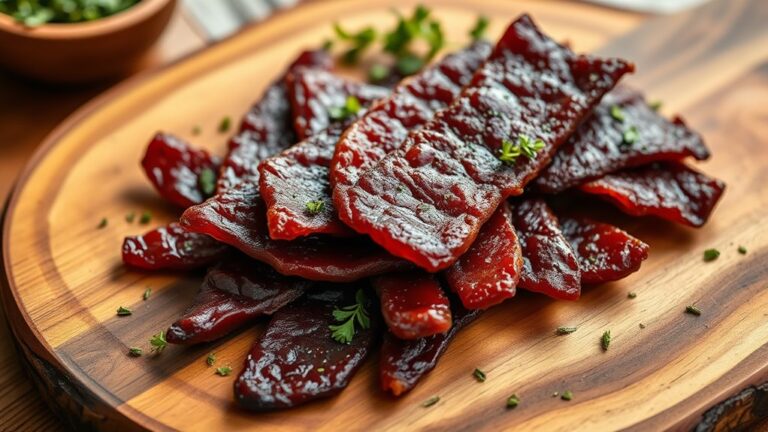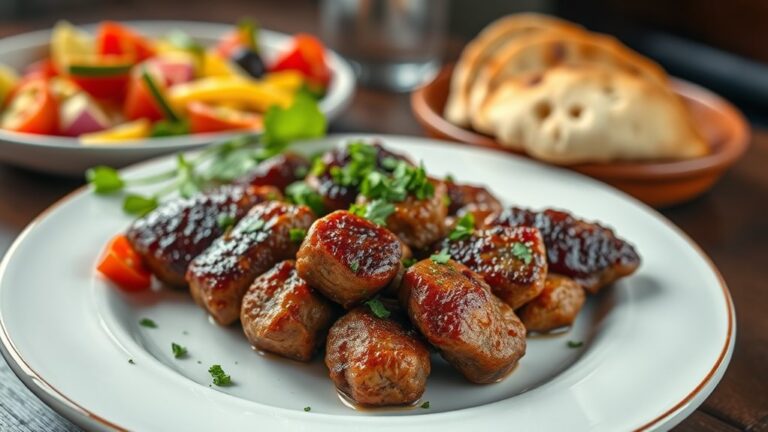As an affiliate, we may earn a commission from qualifying purchases. We get commissions for purchases made through links on this website from Amazon and other third parties.
Air fryers are a healthier and more convenient option compared to deep fryers, making them a better fit for your lifestyle. They use minimal oil, cutting calorie intake by 70-80%, while still delivering that crispy texture you love. With fewer health risks and easier cleanup, air fryers also help you maintain a healthier diet. Deep fryers, on the other hand, can lead to higher calorie consumption and more complex maintenance, with risks associated with hot oil. If you want to discover more about making the right choice for your kitchen, there’s plenty more information waiting for you.
Key Takeaways
- Air fryers significantly reduce calorie intake by 70-80%, making them healthier for frequent use in meal preparation.
- Deep fryers can obscure flavors and contribute to unhealthy fat intake, raising risks of heart disease and obesity.
- Air fryers are easier to clean, with dishwasher-safe components and minimal oil residue compared to the mess of deep frying.
- Safety features in air fryers minimize burn risks and accidents, making them a safer choice for family cooking.
- Assessing cooking habits and health goals can help determine which appliance better fits your lifestyle and dietary needs.
Overview of Frying Methods
When it comes to frying methods, understanding the differences can help you choose the right technique for your cooking needs.
Deep frying involves submerging food in hot oil, typically between 350°F and 375°F. This method creates a crispy texture but requires a lot of oil, leading to higher calorie content.
On the other hand, pan frying uses less oil, making it a more moderate option. However, it still demands careful monitoring of cooking time and temperature to achieve the desired results.
Stir-frying is another quick method, utilizing high heat and constant stirring, which is great for vegetables and thinly sliced meats.
But if you’re looking for a healthier alternative, air frying could be your best bet. An air fryer employs hot air circulation to cook food evenly while using minimal oil. This technique not only gives you that crispy texture similar to deep frying but also reduces calorie intake by 70-80%.
Each frying method varies in oil usage, cooking time, and texture, so consider these factors based on your health considerations and cooking preferences.
Health Benefits of Air Frying

Air frying offers a healthier alternative to traditional frying methods, making it a popular choice for health-conscious cooks. By using an air fryer, you can notably reduce calorie intake by 70-80% compared to deep fryers typically used for frying. This means you can enjoy your favorite fried foods without the guilt. Air fryers require only a tablespoon or less of oil, which helps to reduce fat content in your meals.
One of the standout health benefits of air frying is that it minimizes the formation of harmful substances like acrylamide, which can develop during deep frying. Plus, air-fried foods retain more nutrients and flavors due to reduced oil absorption, promoting healthier eating habits.
Regularly incorporating air-fried dishes into your diet can contribute to a healthier lifestyle, potentially lowering the risk of obesity, heart disease, and diabetes linked to high-fat diets.
In essence, choosing an air fryer is a smarter, healthier cooking option that lets you indulge without compromising your health. So, if you’re looking to make a positive change in your diet, consider embracing the benefits of air frying.
Nutritional Drawbacks of Deep Frying
While air frying offers numerous health benefits, deep frying presents significant nutritional drawbacks that can impact your well-being. The process of deep frying typically requires several cups of oil, which drastically increases the fat content and calorie count of your meals. This can lead to obesity and various health issues.
Here are some alarming facts you should consider:
- Deep-fried foods can contain up to 70% more calories than air-fried versions, contributing to weight gain.
- The high temperatures involved in deep frying create harmful compounds like acrylamide, linked to an increased cancer risk.
- Regular consumption of these fried foods raises your risk of heart disease and diabetes due to unhealthy fats.
- The oil can mask the true taste and nutritional value of the ingredients, leaving you with less flavorful and nutritious meals.
Given these points, it’s clear that deep frying can do more harm than good. You might want to reconsider your cooking methods and explore healthier alternatives like air fryers to enjoy delicious meals without compromising your health.
Safety Features of Each Appliance

In the kitchen, safety is a top priority, especially when using appliances like air fryers and deep fryers. Air fryers are generally considered safer because they don’t involve large quantities of hot oil, which can splatter and lead to burns or accidents.
Many air fryers come equipped with impressive safety features like automatic shut-off and cool-touch exteriors, minimizing risks during cooking.
On the other hand, deep fryers require careful monitoring due to the high-temperature oil they use. While they often include safety features like lid locks and temperature controls to prevent overheating, the presence of hot oil increases the risk of fire hazards.
Users must be especially cautious with proper handling and disposal of this oil to avoid dangerous situations.
Ultimately, while both appliances have their safety considerations, the air fryer stands out for its reduced burn risks and lack of hot oil.
If you’re looking for a safer cooking option, the air fryer’s minimal oil usage and robust safety features may be the better choice for your kitchen.
Cleaning and Maintenance Differences
Cleaning and maintenance are essential considerations when choosing between air fryers and deep fryers. If you want a hassle-free experience, an air fryer might be your best bet.
Here’s what you can expect:
- Removable, Dishwasher-Safe Baskets: Most air fryers have baskets that you can pop in the dishwasher, making cleanup quick and easy.
- Less Oil: With air fryers, you use much less oil, which means less mess and fewer oil residue issues.
- Minimal Lingering Odor: Air fryers produce considerably less odor than deep fryers, so you won’t need to ventilate your kitchen extensively.
- Simple Maintenance: Air fryers require just a quick wipe-down of the interior and basket, while deep fryers demand careful oil management and thorough cleaning routines.
In contrast, deep fryers usually involve a lengthy cleanup process.
You’ll have to cool, dispose of, and manage large amounts of used oil, which can be messy and time-consuming.
Even advanced models that filter oil add complexity to maintenance.
Ultimately, if you value convenience and simplicity, an air fryer is the way to go.
Versatility in Cooking Techniques

When it comes to cooking versatility, air fryers truly shine. These multifunctional appliances can bake, roast, grill, and fry, allowing you to explore a wide range of cooking techniques in one convenient device.
Unlike deep fryers, which focus solely on frying, air fryers handle a diverse array of recipes, from crispy vegetables to delicious chicken wings and even baked goods like cakes and muffins.
The secret lies in their hot air circulation, which guarantees even cooking without the need for submerging food in oil. This method not only enhances versatility but also promotes healthier cooking options.
Plus, many air fryers come with a self-stirring feature, making them user-friendly and reducing the need for constant monitoring while cooking.
Taste and Texture Comparison

The differences in taste and texture between air-fried and deep-fried foods can markedly influence your cooking choices. If you’re debating which method suits you better, consider these key points:
- Crispy Texture: Deep-fried foods often deliver a superior crispiness and fluffy interior thanks to being submerged in hot oil, creating that classic texture you might crave.
- Natural Flavors: Air-fried foods retain more nutrients and natural flavors, giving you a less oily taste while still achieving a satisfying crunch, especially with veggies and chicken wings.
- Seasoning Absorption: With lower oil content, air-fried foods absorb seasoning better, enhancing the flavors without overwhelming them with grease.
- Richness vs. Lightness: Deep-fried foods exude a rich flavor profile that some find irresistible, while air-fried options provide a lighter alternative, appealing to health-conscious eaters.
In taste tests, many experts find no significant difference in flavors for items like sweet potato fries.
Ultimately, your preference may hinge on whether you prioritize that crispy richness or a cleaner, nutrient-rich bite. Choose based on what excites your palate!
Popular Air Fryer Models

Exploring the world of air fryers reveals a variety of popular models that cater to different cooking needs. Each of these air fryers uses advanced technology to provide healthier cooking options compared to traditional deep fryers.
Here’s a quick overview of some popular air fryer models:
| Model Name | Capacity |
|---|---|
| AGARO Regency Air Fryer | 12 litres |
| INALSA Air Fryer | 4.2 litres |
| PHILIPS Air Fryer NA120/00 | 4.2 litres |
| Prestige Nutrifry Electric Digital | 4.5 litres |
| Pigeon HealthiFry Digital Air Fryer | 4.2 litres |
The AGARO Regency, with its 12-litre capacity and 1800W power, is perfect for larger meal preparations. For efficient cooking, the INALSA Air Fryer incorporates smart AirCrisp technology and 360° hot air convection. The PHILIPS Air Fryer uses rapid air technology, making it user-friendly with preset menus. If versatility is what you need, the Prestige Nutrifry offers eight preset cooking modes. Finally, the Pigeon HealthiFry is celebrated for its 360° high-speed air circulation, ensuring healthier cooking.
Choosing the Right Appliance

Choosing the right appliance between an air fryer and a deep fryer hinges on your cooking habits and preferences. Understanding how each appliance fits into your lifestyle can help you make the best choice.
Consider these factors:
- Versatility: Air fryers can bake, roast, and grill, offering more cooking methods than deep fryers.
- Oil Used: Air fryers need little to no oil, drastically reducing fat intake compared to deep fryers, which require several cups.
- Cleaning: Air fryers are easier to clean with their dishwasher-safe parts, while deep fryers can create a messy cleanup with oil disposal.
- Storage Space: Air fryers typically have a more compact design, making them easier to store, while deep fryers can occupy more kitchen real estate.
If you’re looking for efficiency and healthier options, an air fryer is likely the better choice.
For those on a tight budget, deep fryers may seem appealing at first glance, but consider the long-term expenses associated with oil.
Ultimately, think about your family’s size and meal capacity needs to guarantee you choose the appliance that best suits your lifestyle.
Frequently Asked Questions
Which Is Healthier, an Air Fryer or a Deep Fryer?
When considering which is healthier, an air fryer’s ability to use minimal oil and reduce calorie intake considerably makes it a better choice. You’ll enjoy crispy meals with fewer health risks compared to deep frying.
What Are the Negatives of Cooking in an Air Fryer?
You might love the idea of air frying, but it can take longer to cook, limit your meal size, produce uneven results, and leave you craving that rich flavor you get from deep frying.
Do All Air Fryers Expose You to Acrylamide?
Not all air fryers expose you to acrylamide equally. They typically produce lower levels than traditional frying, but factors like cooking temperature and time can still influence acrylamide formation. So, choose wisely for healthier results.
Are Egg Rolls Better in the Air Fryer Than Deep Fryer?
You might be surprised, but air-fried egg rolls are often better. They’re crispier, healthier, and quicker to cook. Plus, cleanup’s a breeze, letting you enjoy your meal without the greasy aftermath of deep frying.
Final Thoughts
Ultimately, the choice between air fryers and deep fryers comes down to your lifestyle and preferences. If you’re looking for a healthier option that still delivers crispy goodness, an air fryer might be your Excalibur in the kitchen. However, if you crave the rich, indulgent flavors of traditional frying, a deep fryer could be your go-to. Like choosing between Arthur and Lancelot, each has its strengths—just make sure to select the one that best suits your culinary quests.





